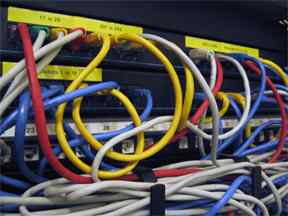NoSQL databases offer improved performance, spur ecommerce innovation, may be less expensive than other options, and could improve management of big data. In short, your ecommerce business’s next competitive advantage could be your database.
Competitive advantages are slippery things. For example, a few years ago you might have been able to use free shipping as a competitive advantage for your online retail business. But now, free shipping is often standard.
Ecommerce platforms used to be a competitive advantage too. Features and integrations could set your business apart. But now, all leading ecommerce platforms offer a similar set of features. To find a competitive advantage, look elsewhere — such as customer experience.
Customer experience is a recent battlefield, wherein one retailer or another might gain a competitive advantage. Retailers — from big-box stores to pure-play ecommerce businesses — are trying to provide more relevant, more personalized, and more compelling shopping experiences.
In short, your ecommerce business’s next competitive advantage could be your database.
To do this, a company might need to use a combination of technologies — like big data analytics, machine learning, artificial intelligence — and business savvy. After all, your shoppers want, for example, relevant, specific, and personalized search results delivered in milliseconds, regardless of their geographic location or device. They want messaging, content marketing, product suggestions, and a buying experience tailored for them.
Database a Competitive Advantage?
Ecommerce operations will have a few ways to compete around customer shopping experience. But one method, which might get overlooked, is the database you choose to run your business on.
Many, if not most, ecommerce platforms in use at mid-market ecommerce and brick-and-click operations rely on a relational database management system — RDBMS. These sorts of databases have long powered software, applications, and websites. They have, in a sense, gotten business this far. While RDBMS can be good and very useful in many applications, it is ill suited for ecommerce.
With a tabular structure, an RDBMS system cannot easily manage product information, which can vary greatly and may not be best for some of the other forms of data that ecommerce businesses require.
Kyle Banker, author of a book about MongoDB, a NoSQL document database, once wrote that if you looked at an ecommerce platform running on a relational database, you would find “a flurry of [database] tables working together to provide a flexible schema on top of a fundamentally inflexible style of database system.”
In an effort to deal with product data in an RDBMS, developers have to employ relatively complicated data models, such as entity, attribute, value; class table inheritance; or character large object (CLOB).
In contrast, NoSQL databases make managing product, order, and customer information relatively easier, potentially freeing merchants to collect more shopper and sale data. Merchants could then analyze that data more readily and implement solutions that genuinely improve the shopping experiences, gaining a competitive advantage.
This means that as a company looks at software solutions like an ecommerce platform or a product information manager, that company may want to look for solutions built on NoSQL.
NoSQL Offers Several Advantages
Compared to relational databases, NoSQL may offer better performance, scalability, availability, affordability, and flexibility.
Performance. NoSQL databases often respond more quickly to the queries common in an ecommerce application. When a visitor looks at a product detail page or runs a site search, that visitor is effectively interacting with your database. Thus a faster database can result in better site performance.
Scalability. An RDBMS often runs on a single server. To meet demand, you need a bigger and more expensive server. NoSQL databases are often built to run on distributed and less expensive servers. So on Black Friday and Cyber Monday, NoSQL scales easily.
Availability. NoSQL databases are often built to expect server failures. When something goes wrong, a query is simply routed to another server in the cluster.

NoSQL databases tend to use clusters of small, inexpensive servers, so that when a single server fails, NoSQL databases can keep working. Image: Couchbase.
Affordability. Since NoSQL databases run on clusters of commodity servers rather than the relatively larger and more powerful servers needed for an RDBMS, NoSQL can be less expense for your business.
Flexibility. For NoSQL document databases, data structure is enforced in code — not in the database — so that NoSQL can ingest data in many forms, structured or unstructured. This helps with things like big data or absorbing product information from multiple sources.
But What About Transactional Integrity?
If there is an argument against using NoSQL for ecommerce, it’s transactional integrity and NoSQL’s flexibility.
In fact, if you look on just about any forum discussing NoSQL versus RDBMS, you will see a comment like this one.
The point of using MySQL or any other RDBMS is to have transactions. With transactions, you can ensure everything you need to get done, gets done properly and in the right order, whereas using something like MongoDB doesn’t really ensure that.
On the surface this is true. NoSQL databases do not usually enforce transactions or schemas in the same way that an RDBMS does. NoSQL in this sense is unconstrained.
It is, however, not really a question of database transactional integrity, but where transactional integrity is enforced. For a typical RDBMS, the database ensures transactional integrity. For a typical NoSQL database, the developer enforces transactional integrity in the code.
An analogy (and extreme exaggeration) might help make this point.
Imagine you’re about to buy a new car. You have two choices.
- You can buy a brand new Ferrari for $100, but it doesn’t come with a radio.
- Or you can buy a 1985 Yugo GV for $399 with a functional radio.
Even without a radio, the Ferrari is still a much better value.
Now imagine that you’re going to pick a database for your ecommerce application. NoSQL offers all the things described above, but you’ll need to manage transactional integrity. Or you can pick an RDBMS for the radio.
Mid-market ecommerce businesses need to find ways to improve customer experience and customer relationships. Enabling technology like NoSQL databases may be the place to look for a new competitive advantage.
At the time of writing, many online sellers are still using relational databases to power their sites and systems. But industry leaders, including Amazon, Walmart, and eBay, as examples, are already using NoSQL databases for at least some of their systems.




